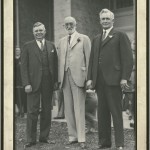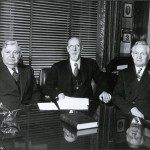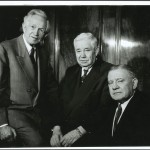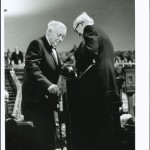J. Reuben Clark served as Counselor in the First Presidency of the The Church of Jesus Christ of Latter-day Saints for 28 years, commencing with his call to be Second Counselor to President Heber J. Grant in April 1933, immediately following his ambassadorship to Mexico. He served as counselor to Heber J. Grant, George Albert Smith, and David O McKay.
Prior to this, during another lull in his political career, on 7 June 1925 Clark was named to the general board of the Young Men’s Improvement Association of the Mormon Church, where he served until being called back to Washington in April 1926. Before Clark took up his appointment as Ambassador to Mexico, President Heber J. Grant invited him to speak at the October 1930 general conference.
Heber J. Grant
Clark had been given many opportunities to address the Latter-day Saints during his political career, but the call to the First Presidency was one he was not prepared for. In a letter to President Grant, he stated,
I have never aspired to Church office—its honor and dignity I appreciated, but its responsibilities seemed too grave. I do not now so aspire. If I felt that my personal preferences should now control me, I would ask to be allowed to continue working in the ranks. But when, as now, a call comes from my superior officers, charged with the responsibility of presiding over the Church and acting under the inspiration of the Lord, then I, responsive to my training and my faith, must answer to the call, not only as a clear duty but as a great privilege (D. Michael Quinn, J. Reuben Clark: The Church Years. Provo, UT: BYU Press, 1983, 40).
Once sustained as Second Counselor to President Grant on 9 April 1933, Clark addressed the conference,
“Should any of you have hopes about my work in this high office to which I am called, I trust I shall not too much disappoint you. If any of you have misgivings, I can only say that your misgivings can hardly be greater than my own. I am keenly conscious of my own deficiencies. I come late in life to a new work” (Church Years, 53).
But J. Reuben Clark was not leaving his political life totally. President Grant wished to take advantage of all his contacts as one of the country’s elder statesmen. Clark was already on the board of several organizations in Utah and a speaker at many national associations, but a few days after general conference, he was invited to be on the board of the New York-based Equitable Life Assurance Society of the United States. Pres. Grant encouraged the appointment and Clark served on that board for 25 years. Several other calls from Washington punctuated Clark’s service in the First Presidency under Prophet Grant, the most dramatic of which was the almost certain nomination by the Republican party of J. Reuben Clark as their candidate for the 1934 senatorial election. Even though Clark’s high ambition was to become a Senator, and he would have had President Grant’s approval, he firmly informed the Republican party that he would not accept such a nomination. He was needed in Salt Lake.
In the October 1934 general conference, following the death of Anthony W. Ivins, Clark became 1st Counselor. His secular interests caused him to travel extensively, as often as possible adding Church duties during these trips. His natural organizational abilities caused some reforms to be implemented. First of all, he encouraged President Grant to delegate the day-to-day unessential office responsibilities, such as personally answering correspondence. Clark also, recognizing that the increased membership of the Mormon Church and its reach far beyond Salt Lake brought with it a diminishing of the possibility of personal attention by the President, introduced practices that limited access to the President.
In September 1938, Europe was on the brink of war. President Grant relied on J. Reuben Clark’s diplomatic experience to make the decision to withdraw missionaries from continental Europe. Initially, American missionaries were ordered to evacuate to the Netherlands and Denmark, but then came the now-infamous Munich Pact at the end of September, allowing Hitler to annex Sudetenland, and the missionaries were allowed to return to Germany. By July 1939, it was obvious that the Pact had failed, and the LDS Church stopped sending missionaries to Germany. When Hitler and Stalin signed their non-aggression pact, “on 24 August 1939 [the First Presidency] arranged with the U.S. State Department for visas and cabled the mission presidents in Germany to evacuate all missionaries immediately to Holland or Denmark” (Church Years, 81).
By 1940, 83-year-old President Grant was suffering from the aftermath of a severe stroke and was physically incapacitated. David O. McKay, who was 2nd Counselor, was seriously ill with a lung ailment. The burden of the First Presidency was on J. Reuben Clark. However, true to his own humility and faith, he did not take upon himself more authority than he had, and consulted President Grant on all major decisions, involving President McKay at every turn. One of the delightful tasks that he had been delegated was to conduct and preside over the cornerstone laying ceremony for the Idaho Falls Temple on 19 October 1940.
Increasing administrative responsibilities necessitated, with the approval of President Grant and President McKay and the ratification of the Twelve Apostles the appointment of five high priests as Assistants to the Twelve. They were sustained, together with of Harold B. Lee as an Apostle, at the April 1941 general conference. This conference was, for the first time, broadcast at Clark’s behest by closed-circuit radio, thereby for the first time reaching an audience outside that covered by the Mormon Church’s radio station, KSL.
George Albert Smith
On 14 May, 1945, President Heber J. Grant died, and the senior Apostle, George Albert Smith, became President of the Church. President Smith kept J. Reuben Clark and David O. McKay as his 1st and 2nd Counselors, respectively. Clark was relieved that the burden he had carried for so long was lightened “I have less responsibility because the new President, George Albert Smith, is reasonably well and therefore able to take the responsibility” (Church Years, 95). President Smith requested that Clark shed many of his secular activities. On 23 September 1945, he was asked to give the first major address at the dedication of the Idaho Falls Temple, where he had dedicated the cornerstone 5 years before.
In January 1948, Clark began a series of Sunday-evening lectures on KSL radio titled “On the Way to Immortality and Eternal Life.” These lectures were later published in the first of his (Clark’s) religious writings. Later that year, history seemed to repeat itself as President Smith’s health worsened to the extent that he was bedridden, and President McKay was in California with his wife who was ill. J. Reuben Clark wrote, “The situation here gets a little more difficult and confining all the time. . . . President Smith is able to spend only two or three hours a day at the office, and that leaves a situation where I have to be here more than I otherwise would” (Church Years, 108). In July 1949, Clark made a bold decision as recorded by President McKay, “President Clark came in. Said that he wanted to talk to me about vacations; that he felt [we] should both go on a vacation, and that it should be settled here and now” (Church Years, 108). It was reported that this was the first vacation Clark had taken since he became a member of the First Presidency.
President Smith’s health remained difficult. Early in 1950, Clark wrote:
The fact is, I am usually at work by eight o’clock in the morning and I normally am constantly at the office until 5:30 and sometimes nearly six, and am here every Saturday. In the night time I usually rest until perhaps nine and then do some work at home. Even then I have great difficulty in keeping anywhere near up on my day to day tasks. I have almost entirely given up any social life beyond the great blessing which is mine in having my children clustered about me, all but Reuben, and they come in and visit me practically every evening for a few minutes. I cannot conceive of any greater blessing than this that could come to me” (Church Years, 110).
On 26 September 1950 Clark introduced a new policy, that of housing multiple wards in one building, rather than a single ward as had been the practice. By this time Mormon Church membership had grown to over a million. President Smith’s health was worsening. In February 1951, he recorded in his diary:
It has been suggested to me that I go to some other part of the country and try to get better. I have felt that the headquarters of the work of the Lord was here. Most of the financial interests of the Church are controlled from here, and I have thought we ought to have men in charge so that in the event of the sickness of the President they could carry on. If the President is sick, things would go forward anyhow. . . .
President Clark: I have done all I can and will do all I can to carry on. I have a real affection for you. I have no desire except to help you and help carry on the work (Church Years, 111).
David O. McKay
President Smith died on 4 April 1951. With President McKay as the senior Apostle, the General Authorities entered the Tabernacle on 8 April 1951 for the first session of Conference. With typical humility,
President Clark immediately took his place with the Apostles, without presuming to have any special function in the conference. President McKay called him from his seat with the Apostles to join in presiding at the first session and to conduct the second session. President Clark “made it beautifully clear that he conducted it by delegation, not by right when he said: ‘I conduct this Conference by courtesy,’ and never before did that word COURTESY mean so much,” wrote Spencer W. Kimball, then of the Quorum of the Twelve Apostles. Elder Kimball added: “Brother Clark is magnificent!!” (Church Years, 112).
After the afternoon sessions, President McKay met with the members of the Quorum of the Twelve Apostles. Joseph Fielding Smith moved that David O. McKay be sustained formally as President of the Church. President McKay then chose Stephen L. Richards as 1st Counselor and J. Reuben Clark as 2nd Counselor. In general conference the next day:
Sensing that Church members would question this change, President McKay . . . said that President Richards had been called as first counselor because he had served longer than President Clark in the apostleship. Emphasizing that this practice was not an “established policy,” President McKay simply said that “it seemed advisable” in the callings of Presidents Richards and Clark. As President McKay continued with his address, he spoke of the unity he felt with his counselors: “We do not want any member in this Church, nor any man or woman listening in to harbor the thought for a moment that there has been any rift between the two counselors who sustained President Smith in the Quorum of the First Presidency, and President Grant for the years that we were together with that inspired leader. Neither should you feel that there is any demotion. President Clark is a wonderful servant. . . . You should understand further, that in the counselorship of the Quorum of the First Presidency these two men are coordinate in authority, in love, and confidence, in freedom to make suggestions, and recommendations, and in their responsibility not only to the Quorum but also to the Lord Jesus Christ and to the people generally. They are two great men. I love them both, and say God bless them, and give you the assurance that there will be harmony and love and confidence in the Quorum of the First Presidency as you have sustained them today (Teachings of Presidents of the Church: David O. McKay retrieved 15 October 2011).
J. Reuben Clark, true to his nobility, when called upon by President McKay to speak before the newly sustained 1st Counselor, in true humility said, “In the service of the Lord, it is not where you serve but how. In the Church of Jesus Christ of Latter-day Saints, one takes the place to which one is duly called, which place one neither seeks nor declines” (April 1951 Conference Report, 151). Then Elder Spencer W. Kimball recorded that by this declaration, Clark “did more in his perfect reactions perhaps to establish in the minds of this people the true spirit of subjection of the individual to the good of the work, more than could be done in thousands of sermons” (The Church Years, 124).
As counselor to Pres. McKay, Clark continued his service as director on the many Church-affiliated corporations as well as the Equitable Life Assurance Society and Western Pacific Railroad. He continued to be in demand as a speaker, and in 1952 he received and Honorary Doctor of Law degree from Brigham Young University. In November 1958, he wrote to a friend, “I feel fortunately for myself, and I hope reasonably so for some others, that my whole life was changed almost a quarter of a century ago since which time my thought and my writing have turned primarily to matters religious. It has been a great thing for me . . . to have the course of my thoughts change. I think it has kept me from falling into some of the incidents of normal old age” (Church Years, 134–35).
In 1959, Stephen L. Richards died suddenly and Clark was once again called to be the 1st Counselor, with Henry D. Moyle as 2nd Counselor. Clark told the June 1959 MIA (“Mutual Improvement Association” — a youth auxiliary of the Mormon Church) conference, “President McKay has appointed me again as a First Counselor in the Presidency of the Church. I am grateful beyond expression for the confidence that implies, grateful for the respect, also, and for the affection which I am sure lay behind it” (Church Years, 137). But his health was deteriorating. On 9 October 1960 Clark addressed general conference, “I renew to you this morning the testimony I have given to you for over a quarter of a century, I believe every conference, a testimony that God lives, that Jesus is his son and is the Christ, a testimony that the Father and the Son appeared to the Prophet” (Church Years, 139).
J. Reuben Clark had served as a counselor in the First Presidency to three Presidents of the Mormon Church during the Great Depression, the New Deal, World War II, into the troubled 1960s.
” His instruction on Church administration, the mission of Church welfare and the danger of debt, the sacrifice of the pioneers, and Church education remain guiding principles. The example he set of humility and sacrifice in church service left an indelible impression on the minds of the Saints. Decades after his death, J. Reuben Clark, Jr. remains one of the most prolifically quoted, revered, and beloved counselors to have ever served in the First Presidency” (Stephen S. Davis, J. Reuben Clark: Statesman and Counselor, 1).




